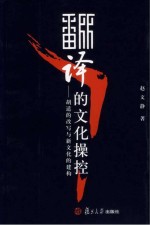
- 作 者:赵文静著
- 出 版 社:上海:复旦大学出版社
- 出版年份:2006
- ISBN:7309053095
- 标注页数:398 页
- PDF页数:421 页
请阅读订购服务说明与试读!
订购服务说明
1、本站所有的书默认都是PDF格式,该格式图书只能阅读和打印,不能再次编辑。
2、除分上下册或者多册的情况下,一般PDF页数一定要大于标注页数才建议下单购买。【本资源421 ≥398页】
图书下载及付费说明
1、所有的电子图书为PDF格式,支持电脑、手机、平板等各类电子设备阅读;可以任意拷贝文件到不同的阅读设备里进行阅读。
2、电子图书在提交订单后一般半小时内处理完成,最晚48小时内处理完成。(非工作日购买会延迟)
3、所有的电子图书都是原书直接扫描方式制作而成。
Chapter 1:Introduction 1
1.1 Rationale for Focusing on Hu Shi and the New Culture Movement 3
1.2 Issues Reflected in the Neglect of Hu’s Rewritings 14
1.3 Overview of the Book 19
1.3.1 Structure 19
1.3.2 Clarification of Terms and Presentation 22
Chapter 2:Rewriting Theory 25
2.1 The Theoretical Context Within and Outside Translation Studies 28
2.1.1 The Shift from a Source -oriented to a Target-oriented Approach 29
2.1.1.1 Literary Criticism 30
2.1.1.2 Even-Zohar’s Polysystem Theory 37
2.1.1.3 Hermans’ Anthology of Translation Studies 40
2.1.1.4 Holmes’ Concept of Translation Sociology 42
2.1.2 The Broadening of the Concept of Translation 44
2.2 Rewriting Theory:An Overview 50
2.2.1 The Control Factors 52
2.2.1.1 The Concept of Control Factors 57
2.2.1.2 Assessing the Notion of Control Factors 61
2.2.2 Forms of Rewriting 76
2.2.2.1 Assessing the Classification 78
Chapter 3 :Hu Shi Canonised:The Interaction Between Ideology, Poetics and Patronage 85
3.1 The Hu Shi Canon 86
3.2 The Macro-Ideological Climate 89
3.2.1 The Political Situation 90
3.2.2 Official Attitudes Towards Learning from the West 92
3.2.3 Reform in Education 100
3.3 Hu’s Seminal “Eight Don’ts”, its Nature as Rewriting and its Impact on Literary Circles 102
3.3.1 The Essay 106
3.3.2 Hu’s Essay as Rewriting 115
3.3.2.1 The General Influence of the Renaissance Model 115
3.3.2.2 The Influence of Pound’s “A Few Don’ts” 127
3.3.3 The Impact on Chinese Language , Literature and Translation 133
3.4 Institutional Settings and Patronage 139
3.4.1 Hu Shi and New Youth 140
3.4.2 Hu Shi and Beijing University 147
3.4.3 Support from Professionals 157
3.5 Conclusion 164
Chapter 4 :Hu Shi’ s Rewritings of Ibsen and Their Impact on Chinese Society 167
4.1 Ibsen as Seen in the Eyes of His English Rewriters 168
4.1.1 Major Sources Through Which Hu Shi Accessed Ibsen 168
4.1.2 William Archer’s Translation of Ibsen :Authoritative and Poetics-oriented 171
4.1.3 George Bernard Shaw’s Interpretation of Ibsen 185
4.2 Hu Shi’s Critical Essay “Ibsenism” 196
4.2.1 Production of the Essay 198
4.2.2 Some Textual Analysis of the Essay 204
4.2.3 Ibsenism or Hu-Shi-ism? 209
4.2.4 Hu’s Filtering 219
4.2.5 Conclusion 224
4.3 Hu Shi’s Imitation of Ibsen :Life’s Greatest Event 225
4.3.1 Hu’s One-act Play 229
4.3.2 The Ideological and Poetological Needs of the Target Culture 235
4.3.3 Comparative Analysis of Ibsen’s and Hu Shi’s Plays 250
4.3.4 Conclusion 263
Chapter 5 :Contextual and Textual Analyses of Hu Shi’s Translations 266
5.1 Choice of Source Cultures 267
5.1.1 Indirect Translations 267
5.1.2 Russian and French Short Stories 272
5.1.3 The Impact of Hu’s Choices on Chinese Literary Creativity and Translation Output 278
5.2 Generic Choices 279
5.2.1 Introducing General Trends in World Literature 280
5.2.2 Lessons Drawn From Liang Qichao’s Failure in Advocating “Political Fiction” 285
5.2.3 Introducing Innovative Writing Techniques 294
5.3 Thematic Choices 300
5.3.1 Patriotism in the Face of Foreign Invasions 302
5.3.2 Individualism and Women’s Position in the Family 305
5.3.3 Opium and the Apathetic State of the Population 306
5.3.4 Mirroring the Life of the Oppressed and the Victimised 309
5.4 Hu’s Translation Strategies 312
5.4.1 Domesticating Imported Elements 315
5.4.2 Contextualising and Historicising Foreign Elements for Chinese Readers 332
5.4.3 Interventions in and around the Text 337
5.5 Conclusion 343
Chapter 6 :Conclusion 345
Bibliography 356
Appendix 1 395
Appendix 2 398
